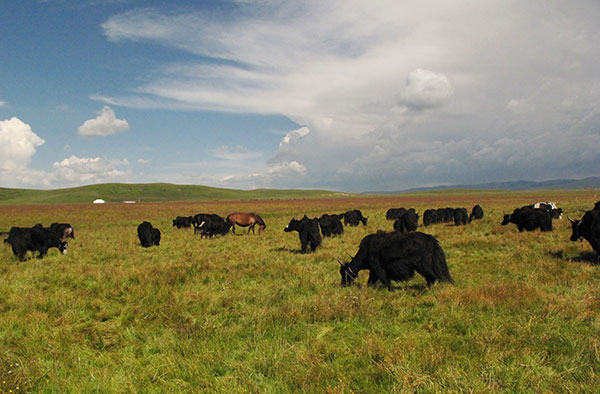 |
|
Yaks graze in a summer pasture near Rekun village, Aba, in July. [Photo by Li Yang/China Daily] |
Grassland protection
Zamzon said the project has improved the quality of life and helped the environment: "The government strongly supports our efforts to protect the grassland, forests and rivers. I'm happy that the grassland I have lived on all my life is being protected, and that people are enjoying more-comfortable lives."
Every nomadic family in the prefecture owns about 1 to 2 square kilometers of pasture. They pay special attention to protecting the grassland, and some areas are left fallow for a certain period of time to allow the land to regain vital depleted elements such as nitrogen, which is essential for plant growth.
The decoration, color schemes and internal structures of the new houses retain strong links with traditional Tibetan dwellings: One room in each building is reserved for prayer, and is decorated with Buddhist statues, portraits of senior local monks known as "Living Buddhas", joss sticks, candles and prayer mats. MP3 players fill the room with religious music throughout the day.
Because Tibetan nomads have no experience of a settled life, the local government persuaded the village elders to take respected members of their communities to inspect completed resettlement projects in neighboring towns, and then relate their findings to friends and neighbors.
The nomads gradually began to appreciate being settled, especially during winter, the worst time to live in a tent on the grassland, according to Qiombo, the head of Rekun village. "The villagers pray every day at home, and also visit the local temples regularly. Moving into a house has had no effect on their religious beliefs and activities at all," he said.
Banyou town lies in neighboring Ruo'ergai county. Even after they were resettled, the residents of the town's five villages continued to pray in the same five temples they used before.
"Living together makes it more convenient for us to go to the temple together in winter," Tashi, a local resident, said. "The fact that living a settled life doesn't influence our religious lives has helped us adapt quickly. The government offered several projected house plans, and each family chose the one they preferred."
Samba, the head of Qiongxi town, said that the new houses were built in 2008, according to the needs and number of local families. However, because many young people have now married and started their own families, the government will be required to carry out a new round of resettlements to accommodate them.
The children now find it easier to attend the village primary school, where they can learn either Tibetan or Chinese, and the township nursing house and clinic takes care of the needs of senior residents.
Most of the young people still take the family yaks to the pastures in summer and autumn. "Having a house gives them the option of a new life during winter. They know that the government will allow them to keep their pastures, so there's no reason for them not to move into a house," Samba said.
Last year, all the resettled families in Aba were issued with title deeds for their houses. "The houses are their assets now, and they can be used as collateral for bank loans," he added.
Since resettlement, the residents of Aba have been able to boost their incomes by turning their new dwellings into guest houses for tourists. In some villages in Songpan, situated along the only road to Jiuzhaigou Valley, a national tourist resort in the north of Aba, the average annual per capita income is comparable with that earned by middle-class workers in Beijing and Shanghai.
"We cater to tourists from April to November every year, and then we go on vacation to warmer places such as Chengdu, Kunming, Thailand, and the Maldives for the rest of the year," said Jamzo Najam, a 20-something who owns a family hotel in Chuanpan, a village in Songpan.
"Every morning, I pray in the family hall and worship the Buddha. I also donate hundreds of thousands of yuan to the local temple every year. Making money doesn't conflict with Buddhism," he added.
New lives, old skills
Zamrenzo, a 19-year-old Tibetan who runs a guesthouse in Muchang village, Songpan, sat in a spacious, neatly decorated guest room with his grandmother, who rotated a prayer wheel and quietly murmured Buddhist sutras.
"I remember how my parents always put my older brother and me into a basket carried by yaks when we moved from place to place on the grassland. As long as the adults decided to move that day, we children had no choice but to sit in the basket, no matter how bad the rain, snow or wind. Every adult had his or her job. Nobody took care of us," he said.
Although Zamrenzo now hires helpers to herd his families' yaks in the summer pasture, he and the other young people in the village still pay special attention to learning the traditional skills from the seniors, who are very happy to pass on the old skills to the new generation, and teach them how to make yak hides and fur into useful everyday objects.
He said tourists are always interested with the traditional crafts and Buddhism. "Tourism opens new windows for interaction between different cultures and peoples", he said.
"Why do some people think Tibetans should always live in a tent and herd yaks on the grassland?" he asked. "We have the freedom to pursue a happy and comfortable life as we wish, and we are no different from those people who look at us just as they would look at a potted landscape."
Contact the writer at liyang@chinadaily.com.cn